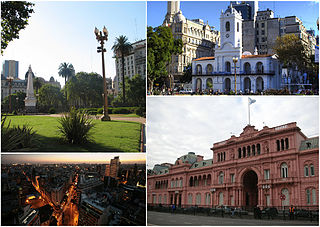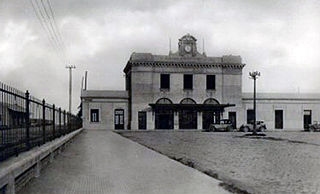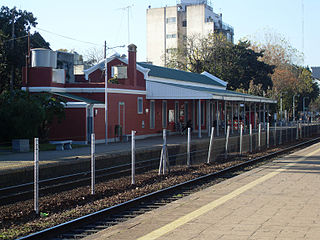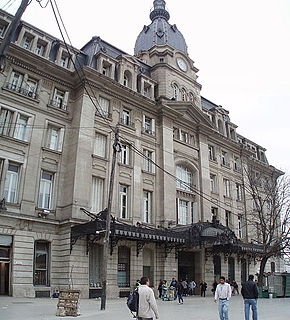
Belgrano is a leafy, northern barrio or neighborhood of the city of Buenos Aires, Argentina.

Palermo is a neighborhood, or barrio of the Argentine capital, Buenos Aires. It is located in the northeast of the city, bordering the barrios of Belgrano to the north, Almagro and Recoleta to the south, Villa Crespo and Colegiales to the west and the Río de la Plata river to the east. With a total area of 17.4 km2 (7 sq mi), Palermo is the largest neighborhood in Buenos Aires. As of 1991 it had a population of 256,927 inhabitants. It is the only barrio within the administrative division of Comuna 14.

Buenos Aires, autonomous city and capital of Argentina, is composed of forty-eight neighbourhoods. The city is also legally divided into communes, each one including one or more barrios. Among the most visited and populated barrios are Palermo, Recoleta, Puerto Madero, Belgrano, San Telmo, La Boca, Monserrat and Caballito. Sectors of the city are also traditionally known as neighborhoods by the inhabitants of Buenos Aires, but not officially by the authorities of the city; some examples include Chinatown, Barrio Norte and the Microcentro.

This article is about the geography and urban structure of Rosario, which is the largest city of the province of Santa Fe, Argentina, and the third most populous in the country, after Córdoba and Buenos Aires. It is located about 300 km (190 mi) north of Buenos Aires, on the Western shore of the Paraná River, and it has about 910,000 inhabitants. It is surrounded by smaller cities and towns that form a metropolitan area with a population of about 1.2 million according to the 2001 census [INDEC].

Munro is a city of the Vicente López Partido in northern Greater Buenos Aires, Argentina, best known for its jeans and apparel stores and outlets. It is located some 20 km from the downtown of the city.

Belgrano is a barrio (neighborhood) in the west of Rosario, Argentina. It is named in honor of Manuel Belgrano, creator of the Argentine flag.

Colegiales is a barrio or district in Buenos Aires, Argentina. It is located between Alvarez Thomas av., Forest av., De los Incas av., Virrey del Pino st., Cabildo av., Jorge Newbery st., Crámer st. and Dorrego av. This neighborhood offers a vast amount of contrast and opportunities. There are large and tall buildings that go from the Crámer street to Avenida Cabildo and traditional houses up to three stories. This district has become a busy one with lots of pedestrians and cars that go about on the streets. This neighborhood is mainly residential, with some non-residential areas like the classification yard in the north-east zone, the fairs in the south-west, and the UCA Colegiales campus in the south-east.

Florida Este is a city of the Vicente López Partido in the northern suburbs of Greater Buenos Aires, Argentina. It is principally a middle-class neighbourhood and is located between the cities of Olivos and Vicente López.

Patio Parada is a rail yard in Rosario, province of Santa Fe, Argentina. It is an important part of the railway system of the city and has been designed as the future site of a multi-modal public transport terminus. Formerly belonging to the Ferrocarril General Bartolomé Mitre company, it is now managed by the Nuevo Central Argentino (NCA) railway company. It employs a broad 5 ft 6 in (1676 mm) gauge railway.

Monserrat or Montserrat is a neighbourhood in the east of the Buenos Aires CBD. The district features some of the most important public buildings in Buenos Aires, including city hall, the city legislature, Casa Rosada, the Colegio Nacional de Buenos Aires and the Libertador Building, among others.

The Rosario and Puerto Belgrano Railway was a French-owned railway company which operated a broad gauge, 5 ft 6 in, single track line between the cities of Rosario and Puerto Belgrano in Argentina. Puerto Belgrano, near the city of Bahía Blanca in Buenos Aires Province, is the main naval base in Argentina. The original idea behind the building of the railway was to link points that were closer to either Rosario or Bahía Blanca than they were to Buenos Aires, thereby taking traffic from the British-owned companies BA Great Southern and BA Western railways.

The General Bartolomé Mitre Railway (FCGBM), named after the former Argentine president Bartolomé Mitre, is one of the six state-owned Argentine railway lines formed after President Juan Perón's nationalisation of the railway network in 1948 and one of the largest of Argentina. The six divisions, managed by Ferrocarriles Argentinos were later broken up during the process of railway privatisation beginning in 1991 during Carlos Menem's presidency.

The General Manuel Belgrano Railway (FCGMB), named after the Argentine politician and military leader Manuel Belgrano, is a 1,000 mmmetre gauge railway and the longest of the Argentine system. It was one of the six State-owned Argentine railway companies formed after President Juan Perón's nationalisation of the railway network in 1948.

The Central Argentine Railway (CA) was one of the Big Four broad gauge, 5 ft 6 in British companies that built and operated railway networks in Argentina. The company had been established in the 19th century, to serve the provinces of Santa Fe and Córdoba, in the east-central region of the country, although it would later extend its operations to Buenos Aires, Tucumán and Santiago del Estero.

The Buenos Aires and Rosario Railway (BA&R) was a British-owned railway company that built and operated a 5 ft 6 in broad gauge railway network in Argentina, where it was known as the "Ferrocarril Buenos Aires y Rosario".

The Central Northern Railway was the first 1,000 mm railway built by the Argentine State Railway. Its aim was to extend the existing British-owned Central Argentine 5 ft 6 in railway from Córdoba to Tucuman and metre gauge was chosen for economic reasons.

The Province of Buenos Aires Railway was a state-owned company that operated a 902 km 1,000 mmmetre gauge railway network in the Province of Buenos Aires in Argentina. Founded in 1907 as the "Ferrocarril Provincial del Puerto de La Plata al Meridiano V", the company changed its name to FCPBA in 1924, in 1951 it was taken into state ownership and in 1953 it was absorbed by the state-owned Belgrano Railway. The FCPBA should not confused with the similarly named French–owned Compañía General (CGBA) which also operated in the Province.

Florida Oeste is a city of the Vicente López Partido in the northern suburbs of Greater Buenos Aires, Argentina. It is principally a middle-class and industrial neighbourhood located between the barrios of Villa Martelli and Munro, also in the same partido (department).

Retiro Station is a railway terminus in the Buenos Aires central business district in Argentina, located in the district of Retiro, opposite Plaza San Martín, a large public square. It is part of the Retiro station complex.

Retiro Station is a large railway terminus located in the district of Retiro of the city of Buenos Aires. The station is located just opposite Plaza San Martín, a large public square; and is part of the Retiro station complex.
























